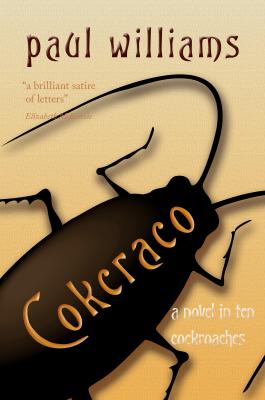Cokcraco. Paul Williams
Читать онлайн.| Название | Cokcraco |
|---|---|
| Автор произведения | Paul Williams |
| Жанр | Контркультура |
| Серия | |
| Издательство | Контркультура |
| Год выпуска | 0 |
| isbn | 9781922198099 |
Cokcraco
a novel in ten cockroaches
by
paul williams
[Lacuna]
2013
“Paul Williams has written a novel that provides every conceivable narrative pleasure. Cokcraco is a brilliant satire of letters set against the backdrop of post-colonial Africa. I cannot praise this novel highly enough.”
– Elizabeth McKenzie, author of Stop That Girl!
Contents
‘The Cockroach Artist’ by Sizwe Bantu
‘Afrikan Metamorphosis’ by Sizwe Bantu
‘Cockroach Liberation’ by Sizwe Bantu
8. Saltoblattella montistabularis
‘The Modernist Afrikanist dekonstructs himself’ by Sizwe Bantu
‘Death of a Cockroach’ by Sizwe Bantu
Cokcraco
From da kokroach point of view, humans are irrelvant. Kokroaches no like em. Doan want em. Do not even tink bout em. Doan care for deh conversations. Books we like to eat, not read. We wish humans dead so we can eat em too.
– Sizwe Bantu, The Cockroach Whisperer, 2010
Storytelling …
more venerable than history,
as ancient as
the cockroach.
– J.M. Coetzee
1. Blaberus craniifer
Death-head cockroach
The death-head cockroach or Blaberus craniifer is marked with a dark spot on its thorax, which, with a stretch of the imagination, looks like a skull. It will eat anything, even faeces, to satisfy its hunger. It has wings, but is incapable of flight, and chooses rather to confront its enemies by emitting a repulsive odour. It is most commonly found in so-called Third World countries, and because of its markings is often the victim of negative projections.
You’re driving down a red dirt road in the middle of South Africa, having turned off at the intersection of nowhere and nowhere. You’re lost. You’re late for a meeting. The air-con in the rental car doesn’t work, and you’re wearing a European suit. You should stop and ask for directions, but you’re male, genetically programmed never to ask for directions.
Three men stand in the road. One brandishes a panga—a machete. One points the barrel of an AK-47 at your face. The middle one holds up the open palm of his hand and bangs on the bonnet. You stop the car.
1 Umlungu: Zulu (n). Derogatory. White man. Origin: white foam on the beach, i.e. white scum.
‘Where you going, umlungu?’1
‘Open up here, sharp sharp, man.’
Your blood runs cold.
No, no, no. Your blood does not bloody run cold. Only the blood of ectothermic creatures, like frogs, fish, geckos, crocodiles, chameleons, snakes, spiders, centipedes and cockroaches, runs cold. Your blood pumps hot and fast through your body, and your brain sends frantic messages to your fight or flight centres: your heart, your limbs, your brain. Epinephrine increases your heart rate, constricts your blood vessels, dilates air passages, and you’re ready for a fight … or more likely in this case, flight.
Think. Think! You should drive right straight at them, through them; knock them over like bowling pins. But your leg locks into a cramp on the pedal. Two faces press against the passenger window. The leader—the one with the AK-47—stands his ground in front of the car. No false moves, the fearsome eyes say. Try not to stare at the barrel of the ubiquitous AK-47.
Mikhail Kalashnikov, your invention is alive and well.
The one with the panga raps on the glass. Tak. Tak. Tak. ‘Where you going, umlungu?’
Your voice, no matter how hard you try to sound calm, is hoarse and shaky. Don’t show any fear. Pretend all is cool. ‘To … to … to the university.’
‘Heh, heh, heh.’ The young man performs a mini-dance of triumph in front of the car.
Is it too late to pray to the god whose existence you have denied all your life?
This country is the crime capital of the world; South Africa is in Guinness World Records for the highest carjacking figures. A motor vehicle is hijacked every forty to fifty minutes. More than twenty-five motor vehicle drivers become victims of hijackings daily. South Africa also gets the gold medal for murder and rape: a murder every thirty seconds, a rape every fifteen; one in four women have been raped; one in ten tourists has had something bad happen to them. And here you are. Fifteen seconds tick away and the country is waiting for its next victim.
You’re dead.
And they’re waiting.
It’s a rental, you want to say. It’s not mine. Take it. I have no cash. No cash. No gold. But your tongue is thick and dry. Your skin—your white umlungu skin—is clammy.
‘Can we have a lift?’
You must look even whiter now. ‘What?’
‘A ride. We need a ride to the university. Can you give us a ride?’
They’re playing with you. Even now you
